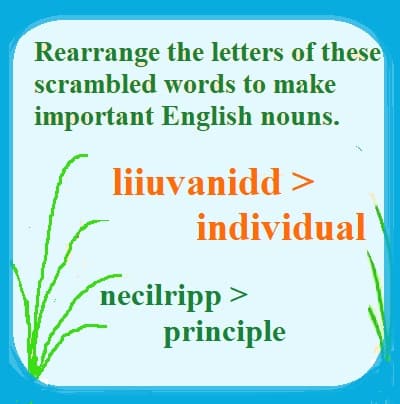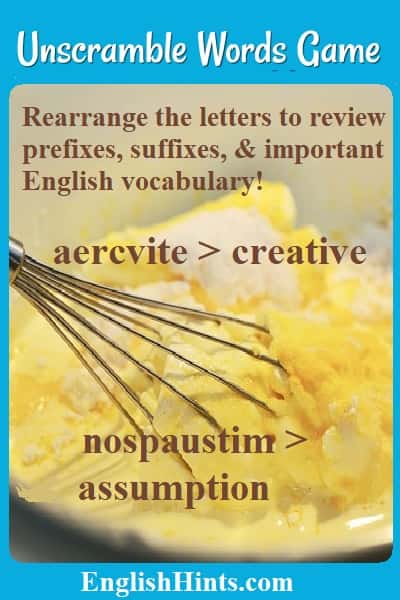Play Unscramble Words
Unscramble words and other word scramble games are a great way to practice word recognition skills (not to mention spelling and suffix use.) Besides being fun, they help you get more familiar with common patterns in English words.
The scrambled word games here let you practice some of the most common words in English academic vocabulary—words from Level 1 and 2 of the Academic Word List (AWL).
(Level 1 gives the 60 most common words of the AWL and level 2 gives 60 more. Only a few are practiced on this page!)
(Many adjectives will have the adjective endings discussed in the Suffix List, and many of the nouns have the suffix endings belonging only to nouns. See the Extra Help below for quick lists.)
Unscramble Words Game: Adjectives
Can you unscramble these letters to find useful adjectives? They're listed in the extra help below, but it's better if you can guess them from word meanings, so I've included a hint after each scrambled word.
Try playing around with the order of the letters on a piece of paper, especially if you can see a common suffix among them. Answers are at the bottom of the page-- but don't peek until you try!
1. mitteedas. Hint: an approximate amount; guessed at
2. cifepisc. Hint: one certain individual or group, not just anyone or anything related
3. bavelari. Hint: subject to change
4. larentev. Hint: closely connected or pertinent
5. versiupo. Hint: before
6. nitardolati. Hint: the customary way of doing something
7. seroufculer. Hint: able to figure out a way of accomplishing something, even when there isn’t an obvious way
8. petrapiopar. Hint: it means fitting or proper
9. tercisevirt. Hint: something is limiting
10. fenicebali. Hint: describes how something can be good or helpful
11. cintisagfin. Hint: describes something meaningful or important
12. sitoncents. Hint: a word for things that have the same pattern, form, or texture all the way through. It's almost the opposite of variable
13. balevalia. Hint: this adjective says you can obtain something.
Unscramble Game 2: Nouns

Knowing a few basic noun suffixes like -tion (or -sion), -ment, -ity, -ence, -ance, -ency, or -ency will make it easier to solve these noun unscramble word games. It might help to look for the prefixes com-, con-, and in- (on three of these words) as well as suffixes. Then the base that is left will be easier to see.
See the "Extra Help" section below if you would like to see a complete list of possible words, and more ways to recognize some nouns.
Here are the nouns to unscramble, plus a hint for each word. Answers are at the bottom of the page.
1. rutuscret. Hint: a building or the way something is put together
2. cosmocine. Hint: the study of financial interactions and the way people make and exchange products, etc.
3. minyomuct. Hint: a group of people who live or work together
4. tanidifectonii. Hint: shows who you are (or who someone is)
5. venintolmev. Hint: participation or connection
6. ituthorya. Hint: power or influence
7. gatryets. Hint: plan of action
8. quoecennecs. Hint: result of some decision or action
9. mabhesletints. This noun was popular in the 1960s to describe authority or organizations supporting the status quo.
10. syainals. Hint: an important type of thinking
11. bitorinudits. Hint: spreading wealth or products around to different people
12. deveceni. Hint: This noun, from the Latin root meaning 'to see,' tells what you might see if you were trying to find some kind of proof.
Extra Help
These words to unscramble can be very difficult if you have no idea which words are included. So I've given lists of possible words below. I didn't want to make it too easy, so I included extra words and did not separate nouns and adjectives.
Besides, it's very useful to understand the suffixes that make words into nouns or adjectives. That's why I added a quick explanation below the lists. If you already know all this-- great! If not, it is worth a little time to study it. It will help you when you read, and especially when you need to choose the correct form as you write.
(If you are writing about a major problem, do you call it a significant problem or a significance problem? Use 'significant'-- the adjective. If you want to explain why it's so important, you would talk about its significance, using the noun.)
Possible Adjectives or Nouns from AWL levels 1-2
These are all important to understand (although most are NOT included in these scrambles):
- analysis, analyst, or analytical,
- appropriate,
- authority or authoritarian,
- available or availability,
- beneficial or benefit,
- consequence or consequential,
- consistency or consistent,
- distribution,
- economic, economics, or economy,
- environment or environmental,
- established or establishment,
- estimate, estimated, or estimation,
- evidence or evident,
- identifiable or identification,
- individual,
- interpretation or interpretive,
- involved or involvement,
- percent or percentage,
- previous,
- principle,
- relevance or relevant,
- required or requirement,
- research or researchers,
- resource or resourceful,
- restricted or restrictive,
- significance or significant,
- specific,
- strategic or strategy,
- structural or structure,
- tradition or traditional,
- variable
As noted on the Suffix List page, adjectives often end in -able or -ible, -al, -ant or -ent, -ed, -ic, or -ive. (Some nouns for types of people, like assistant or resident, also end in -ant or -ent. Individual and variable can be nouns as well as adjectives. But usually these endings indicate adjectives. Adding -ly to many of them will convert them into adverbs.)
Nouns very often end in -ion or -tion, as well as –ance, -ancy, -ence, or -ency, -er, -ism, -ity, -logy, -ment, -ness, or -ship.
Answers to the Adjective Unscrambles
1. estimated, 2. specific, 3. variable, 4. relevant, 5. previous, 6. traditional, 7. resourceful, 8. appropriate,
9. restrictive, 10. beneficial, 11. significant 12. consistent 13. available
Answers to the Noun Unscrambles
1. structure, 2. economics, 3. community, 4. identification, 5. involvement, 6. authority, 7. strategy, 8. consequence, 9. establishment, 10. analysis, 11. distribution, 12. evidence.
For other ways to practice vocabulary from the AWL, see Online Vocabulary Games in English or ESL Quizzes.
Home> Online Vocabulary Games in English > Unscramble Words.
Didn't find what you
needed? Explain what you want in the search box below.
(For example, cognates, past tense practice, or 'get along with.') Click to see the related pages on EnglishHints.
| site search by freefind | advanced |






